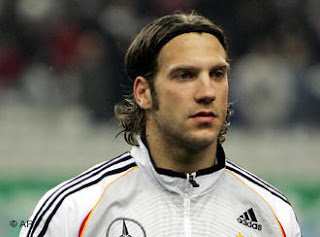 CAREER
CAREERAs a five year old, Torsten fell off his bike and was hit by a car, leaving a scar on the left side of his face.
His professional career began at third division Alemannia Aachen before a move to Werder Bremen in 1996–97, helping the Weserstadion outfit to a German Cup final defeat of Bayern Munich in 1999 and tallying more than 160 Bundesliga appearances and 15 goals over six seasons.
In 2002, a number of Europe's leading clubs were on Frings's trail prior to the World Cup but he opted for a four-year deal with Borussia Dortmund for a reported fee of €10 million, penning the contract two games into the competition. A regular in his first term at the Westfalenstadion, Frings also played 12 times in the UEFA Champions League, scoring home and away against Lokomotiv Moscow.
Frings's 2003–04 season only began on 30 January when he played against Schalke 04, his first game since damaging his knee against VfL Bochum in July. He took over from Tomáš Rosický in the playmaking role and scored four times in 16 games before signing a three-year contract with Dortmund's rivals, Bayern Munich.
Despite winning the domestic double with Bayern and making 29 Bundesliga and ten Champions League appearances, Frings never really enjoyed his football in Munich, and was played out of position by coach Felix Magath. In June he rejoined Bremen for an undisclosed fee on a three-year deal, helping them past FC Basel into the Champions League group.
His professional career began at third division Alemannia Aachen before a move to Werder Bremen in 1996–97, helping the Weserstadion outfit to a German Cup final defeat of Bayern Munich in 1999 and tallying more than 160 Bundesliga appearances and 15 goals over six seasons.
In 2002, a number of Europe's leading clubs were on Frings's trail prior to the World Cup but he opted for a four-year deal with Borussia Dortmund for a reported fee of €10 million, penning the contract two games into the competition. A regular in his first term at the Westfalenstadion, Frings also played 12 times in the UEFA Champions League, scoring home and away against Lokomotiv Moscow.
Frings's 2003–04 season only began on 30 January when he played against Schalke 04, his first game since damaging his knee against VfL Bochum in July. He took over from Tomáš Rosický in the playmaking role and scored four times in 16 games before signing a three-year contract with Dortmund's rivals, Bayern Munich.
Despite winning the domestic double with Bayern and making 29 Bundesliga and ten Champions League appearances, Frings never really enjoyed his football in Munich, and was played out of position by coach Felix Magath. In June he rejoined Bremen for an undisclosed fee on a three-year deal, helping them past FC Basel into the Champions League group.
INTERNATIONAL CARRER
Frings is an all-action, versatile midfielder. He can play anywhere across midfield, although he is most comfortable running deep from his own team's box to the opposition's box. He is however deployed as defensive midfielder where his tough tackling is useful. Frings scored Germany's fourth goal in a 4-2 win against Costa Rica in the opening match of the 2006 World Cup on 9 June 2006 with a powerful drive from more than 30 yards.
Following Germany's penalty shootout victory over Argentina on 30 June 2006, Frings was fined and suspended by FIFA for two games (one of which is subject to a six-month probationary period) for his role in the brawl that broke out between the Argentine and German teams after the match. After reviewing video footage of the brawl, FIFA's Disciplinary Committee determined that Frings had punched Argentine forward Julio Cruz and levelled punishment accordingly, even though Cruz himself had denied that Frings punched him; the second game of the suspension was made probationary due to the Committee's determination that Frings had been provoked into fighting. This suspension decision, announced by FIFA only the day before Germany's semi-final versus Italy on 4 July 2006, rendered Frings unavailable for the important match.
The controversy of the decision was also sparked by the fact that Frings' role in the brawl had been widely accentuated in the Italian media after FIFA had already announced it closed its investigations against German players. Frings answered to the accusations in an interview: "This is all politics. The Argentinians attack us, I defend myself and the Italians get worked up. With this suspension, FIFA just wanted to show that Germany doesn't get special treatment as the World Cup hosts."
He was also called up to Germany's Euro 2008 squad.
Following Germany's penalty shootout victory over Argentina on 30 June 2006, Frings was fined and suspended by FIFA for two games (one of which is subject to a six-month probationary period) for his role in the brawl that broke out between the Argentine and German teams after the match. After reviewing video footage of the brawl, FIFA's Disciplinary Committee determined that Frings had punched Argentine forward Julio Cruz and levelled punishment accordingly, even though Cruz himself had denied that Frings punched him; the second game of the suspension was made probationary due to the Committee's determination that Frings had been provoked into fighting. This suspension decision, announced by FIFA only the day before Germany's semi-final versus Italy on 4 July 2006, rendered Frings unavailable for the important match.
The controversy of the decision was also sparked by the fact that Frings' role in the brawl had been widely accentuated in the Italian media after FIFA had already announced it closed its investigations against German players. Frings answered to the accusations in an interview: "This is all politics. The Argentinians attack us, I defend myself and the Italians get worked up. With this suspension, FIFA just wanted to show that Germany doesn't get special treatment as the World Cup hosts."
He was also called up to Germany's Euro 2008 squad.
ไม่มีความคิดเห็น:
แสดงความคิดเห็น